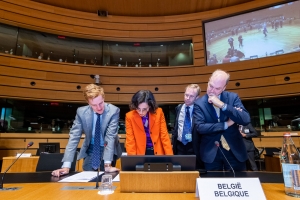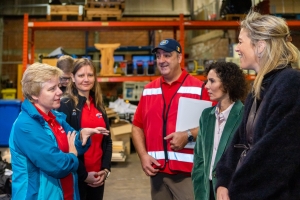Sixth German Belgian Conference: Speech of Mrs. Hadja Lahbib
Guten Morgen,
Dear Minister Barebock - Liebe Annalena,
Excellencies,
Ladies and gentlemen,
I am glad to be in Berlin on the occasion of the Sixth German Belgian Conference. I think this is the best opportunity to come to Berlin as a Minister of Foreign Affairs.
I want to thank Minister Baerbock for her warm welcome. I also want to thank the German Federal Foreign Office, as well as the Belgian Ministry of Foreign affairs for organizing this conference. And thanks to all the participants, especially those who have come from Belgium.
Germany and Belgium are close partners and essential allies. We share a history, we work together on so many levels and we are defending the same values on the world stage.
This conference is the symbol of this relationship and constitutes a great occasion to discuss today’s most important issues, and perhaps, modestly, to contribute in tackling some of the global challenges. I hope today’s discussions will reveal some of the paths that we can take.
The topic that was chosen – Climate change and energy transition - could not have been more appropriate.
Indeed we live in a rapidly changing world and these are among the top issues on the international agenda.
And for good reasons: more than ever, they affect the way of life of all of us. But in fact, I’m convinced that these challenges offer us an opportunity to leave a better world for our children and grand-children, a world that is more respectful of nature; And an economy which is less based on the use of scarce resources and which is more sustainable.
Germany, Belgium and Europe in general are at the forefront of these efforts. Today’s conference will discuss how to move even further.
***
Ladies and gentlemen,
As scientists have long warned, the climate is changing and is already impacting our environment, our water supply, our food production. A recent report from WWF shows that a lot of species have seen their population size reduce by about 75% over the last 40 years. We don’t need to be a scientist to be alarmed by these numbers.
Furthermore, extreme events happen at more frequently.
The two last summers in our regions are a case in point: the tragic floodings in Belgium and Germany in 2021, which cost too many lives and more recently the extreme drought and the wildfires in Western Europe.
I also have in mind the devastation in Pakistan from flooding.
Indeed, in many regions of the world, the consequences of climate change can become a major factor of instability, conflict, resource scarcity and large-scale migration.
It is for this reason that climate change is now an integral part of the Belgian Security Strategy. It is also the reason we are investing in Climate Diplomacy, along with Germany and our European partners.
We thank Germany for hosting last week’s Berlin Climate Security Conference and we support the new ‘Climate 4Peace Initiative’. This will boost efforts to further rally support and interest for this pressing issue.
We will soon meet in Sharm El Sheikh in Egypt to renew our ambitions in this regard.
I hope that it will allow us to find consensus on additional steps with regard to finding balance between adaptation, mitigation and climate finance.
***
Ladies and gentlemen,
Russia’s aggression of Ukraine has led to a robust show of unity in Europe and strong support to Ukraine. I have no doubt that Russia cannot and will not win this war. And I’m convinced that Europe will emerge even stronger.
But in the short term, as you know, we are faced with a number of challenges. The war has impacted our economies and upended our energy supplies. It shows the urgent need to become more energy-autonomous, to accelerate the energy transition, and to diversify our suppliers.
Russia can no longer be considered as a reliable supplier.
Putin is in fact waging an energy war on Europe.
This has severe effects: some of our citizens are struggling to pay their bills, numerous small companies are forced to suspend their activities because of spiking energy prices, many others are losing competitiveness.
We are reacting to this. Our governments are taking unprecedented measures to help our citizens and companies.
The Belgian federal government has presented a package of measures to reduce the burden for citizens and companies.
I know that the German government is also taking significant measures.
But just like our climate goals can only be achieved if we work together,
just like the Covid vaccine roll-out could only be successful by an unprecedented European action and coordination,
our response to the energy crisis can only be efficient and effective in the longer term if it is a European response.
A lot has already been done.
Early in the crisis the Commission adopted a first toolbox of measures; a few months later it adopted the REPowerEU plan to reduce the Union’s dependency on Russian gas. Last June, Member States agreed to quickly replenish their gas storage before the winter and, in July, we agreed to reduce gas demand by 15 %.
But we need to go further with European solutions. And we need to do it now!
In fact, we could have acted sooner to limit the gas price.
Since early in the spring Belgium has been advocating to cap gas prices at the European level in a dynamic way in order to ensure security of supply.
Acting early would have avoided the surge and the scramble for gas that we have seen over the summer.
We need to get gas prices under control as soon as possible. We need effective decoupling of electricity and gas prices. Joint purchasing would also help using our European weight to get better contracts with third countries. And in the long term we need a structural reform of the European energy market.
Let me also emphasize one principle which I think is paramount: we are in this together! We must ensure that all of our actions taken to respond to this challenge are coordinated and do not undermine the principles on which our European Single Market is based: fair competition and a level playing field.
***
Dear Minister Baerbock, Ladies and Gentlemen,
Germany and Belgium can be the trailblazers for an energy transition with security of supply, resilience and which contributes to our climate ambitions.
Our economies are closely interlinked. Germany is, by far, Belgium’s largest trading partner.
Our energy systems are integrated, more now than ever. Belgium, with the large LNG port of Zeebrugge, has indeed become Germany's second most important gas transit supplier.
We share similar ambitions in the development of green hydrogen. Belgium and Germany can become the green hydrogen backbone of European industry. In fact, just this morning, our Prime Minister De Croo has presented our country’s hydrogen strategy.
In offshore wind energy, we are already transforming the North Sea in a strategic source of endless renewable energy supply. Our companies are at the forefront of these sectors.
But more than that, we share a common vision for the European Union, which can protect our citizens and can be a provider of concrete solutions to global issues.
More than seventy years ago, European integration started in the energy sector. At the time it was coal and atomic energy. Today, we have to take the next step in putting climate and energy challenges at the heart of our efforts. This is a must for our common European project.
Yesterday’s Europe no longer exists, tomorrow’s is to be built. Let’s build it together.
I hope that today’s seminar will help to meet these challenges.
I wish to all of you good and productive discussions.
Thank you very much,
Vielen Dank.


